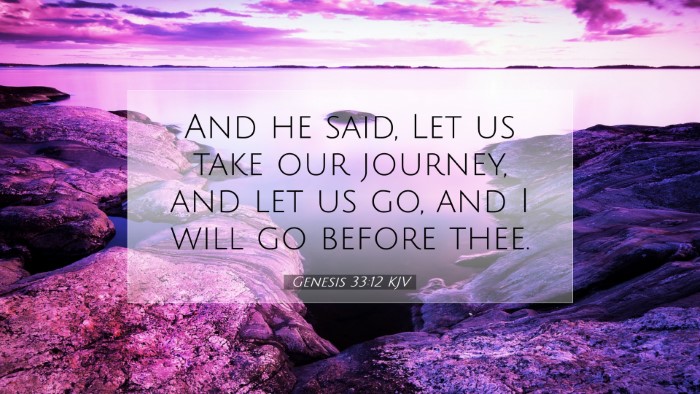Commentary on Genesis 33:12
Text of Genesis 33:12 (ESV): “Then Esau said, ‘Let us journey on our way, and I will go ahead of you.’”
Introduction
The interaction between Jacob and Esau in Genesis 33 is pivotal, illustrating themes of reconciliation, familial bonds, and divine providence. This commentary draws insights from public domain scholars such as Matthew Henry, Albert Barnes, and Adam Clarke, providing a deep exploration of Genesis 33:12.
Contextual Background
Prior to this encounter, Jacob fled from Esau due to the latter's anger over Jacob’s acquisition of the birthright and blessing. Years later, Jacob's return is fraught with tension, compounded by fear of Esau's potential wrath. The reconciliation scene is significant, as it not only resolves this tension but also reveals the transformative power of God's grace.
Verse Analysis
Esau's Proposal
“Let us journey on our way”
Esau’s invitation can be seen as an overture of reconciliation and a display of brotherly affection. According to Matthew Henry, Esau’s words suggest a willingness to move past any animosity, emphasizing a new chapter in their relationship.
“I will go ahead of you”
Esau’s offer to lead indicates his role as a protector and guide, portraying a sense of dignity and kindness. Albert Barnes emphasizes that this is an act of grace on Esau’s part, welcoming Jacob back without malice despite the past grievances.
Theological Insights
Reconciliation as a Divine Principle
This encounter signifies the larger biblical theme of reconciliation. The act mirrors the journey of believers towards reconciliation with God through Christ. Adam Clarke notes that Esau's readiness to forgive reflects divine mercy, encouraging believers to embrace reconciliation in their own lives.
The Role of Providence
The divine orchestration of events leading to this meeting highlights God's providential care. Henry articulates how this meeting was not merely coincidental but foreshadowed the sovereign hand of God guiding Jacob’s life. Every fear Jacob harbored was addressed through God’s provision in Esau’s reception.
Practical Implications
Lessons for Believers
The dynamics of this passage provide several lessons for contemporary believers:
- The Importance of Humility: Jacob approached Esau with humility, demonstrating the necessity of lowering oneself in broken relationships.
- Forgiveness and Grace: Esau's readiness to forgive serves as a profound reminder of the grace offered to us and the need to extend that grace to others.
- Trust in God’s Sovereignty: The transformation in Esau is a testament to how God works mightily in the hearts of individuals, encouraging believers to trust in God’s ability to handle adversities.
Conclusion
Genesis 33:12 serves as a powerful narrative on reconciliation, underscoring the themes of forgiveness, divine providence, and the transformative power of grace. The insights from public domain commentators provide a rich theological framework for understanding how Jacob's journey home was not merely physical but deeply spiritual. For pastors, students, and scholars, this passage invites reflection on the necessity of reconciliation in their own lives and ministries, serving as a poignant reminder of God’s redemptive work in human relationships.


